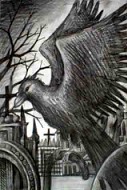 |
"Crow Folklore and Superstition"
by
Gordon L. Krause (Crow Busters Founder)
 During the Halloween season, it’s natural to take notice of the fact that the crow has been regarded throughout history in a mysterious and sometimes ominous way. Perhaps more than any other animal, save the bat or the black cat, the crow and raven have been generally depicted in dark situations in both literature and film. Who doesn’t visualize a raven when they think of macabre writings of Edgar Allan Poe and his preoccupation with omens of death? And who can forget the playground scene in Alfred Hitchcock’s “The Birds”? And in just about every movie with a creepy graveyard or haunted mansion, the eerie calling of crows can be heard in the background. Lets face it, they never got the good press of the eagle, the duck or even the lowly pigeon. Maybe they just had a bad publicist! During the Halloween season, it’s natural to take notice of the fact that the crow has been regarded throughout history in a mysterious and sometimes ominous way. Perhaps more than any other animal, save the bat or the black cat, the crow and raven have been generally depicted in dark situations in both literature and film. Who doesn’t visualize a raven when they think of macabre writings of Edgar Allan Poe and his preoccupation with omens of death? And who can forget the playground scene in Alfred Hitchcock’s “The Birds”? And in just about every movie with a creepy graveyard or haunted mansion, the eerie calling of crows can be heard in the background. Lets face it, they never got the good press of the eagle, the duck or even the lowly pigeon. Maybe they just had a bad publicist!
Some of this can be attributed to our penchant to stereotype creatures for our own pleasure. After all, what better creature to pick for an omen of bad things to come than a large black bird with an unpleasant voice?
But I believe it is goes deeper than that. Being natural scavengers, crows have been hanging around places of human misery such as battlefields since the dawn of civilization. In fact, one of the most disturbing recollections of reporters that visited Hiroshima after the bombing was the absolute plague of crows that descended upon the remains of the city. I’m sure the same scene has played itself out many times throughout man’s violent history.
Yes, crows have been historically associated with death in a very personal way. Add to that the crow’s innate intelligence, and it’s natural that we should have elevated the common crow to a mythological level above and beyond that of a normal bird. So here are some examples of superstitions and folklore that have lasted the test of time. Silly and out of date? Probably. But then maybe you haven’t walked through a dark graveyard lately.
- Crows have been used for the purpose of divination since the time of ancient Rome.
- Finding a dead crow on the road is good luck.
- Crows in a church yard are bad luck.
- A single crow over a house meant bad news, and often foretold a death within. "A crow on the thatch, soon death lifts the latch."
- It was unlucky in Wales to have a crow cross your path. However, if two crows crossed your path, the luck was reversed. "Two crows I see, good luck to me".
- In New England, however, to see two crows flying together from the left was bad luck.
- When crows were quiet during their midsummer's molt, some European peasants believed that it was because they were preparing to go to the Devil to pay tribute with their black feathers.
- Often, two crows would be released together during a wedding celebration. If the two flew away together, the couple could look forward to a long life together. If the pair separated, the couple might expect to be soon parted.
- In Somerset (West Country of England) locals used to carry an onion with them for protection from magpies or crows.
- The French had a saying that evil priests became crows, and bad nuns became magpies.
- The Greeks said "Go to the Crows" the same way we would say "Go to Hell."
- The Romans used the expression "To pierce a Crow's eye" in relation to something that was almost impossible to do.
- An Irish expression, "You'll follow the Crows for it" meant that a person would miss something after it was gone.
- The expression, "I have a bone to pick with you" used to be " I have a crow to pick with you".
|
 |

 Beginners Articles
Beginners Articles